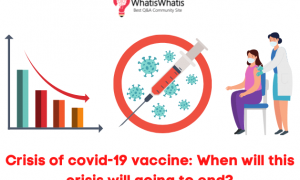With over 222 million cases worldwide and still climbing, the pandemic that is COVID-19 is still ongoing. That means that catching coronavirus is still not as unlikely as many people would hope for.
You might have found yourself googling, “What are the signs and symptoms of coronavirus?” when feeling somewhat sick.
Although the symptoms are close to that of a cold or flu, they’re not quite the same, and it’s important to know the difference.
Read on to find out what they are, so you can be aware of if you might have caught the virus.
These mild signs will be present in most COVID-19 cases. Other severe symptoms may develop.
Fever
Most people who are showing coronavirus symptoms because they’ve caught the virus will end up with a fever.
This can be a very mild fever or one that’s more severe, but if your temperature is high, it’s always best to get a test.
Fatigue
Another of the common COVID-19 symptoms is fatigue.
This can range from extreme fatigue to simply being a little more tired than usual. Many people feel tired and put it down to a lack of energy, hormones, or some other innocuous cause.
However, many times, it’s actually one of the coronavirus signs that people miss because it’s a sign of a lot of things.
A Dry Cough
A cough can also be a sign of a lot of things. However, one of the things that sets a COVID-19 cough apart from any other cough is that the coronavirus cough isn’t productive.
Usually, it will be dry.
Sore Throat
Having a sore throat on its own may not be a sign of coronavirus, but in combination with other signs, it could be. Only 5-10% of coronavirus patients have a sore throat on its own — usually, it comes with other things.
Still, it’s good to be cautious even if you only have this symptom.
Taste and Smell Loss
The loss of taste and smell is another of the COVID-19 symptoms, and it can last for a long time after the virus is gone. Smell dysfunction can actually be the first sign of coronavirus.
If you do have a loss of taste and smell, you should get tested as soon as possible and isolate until you have the results, as this is not a common sign of anything else.
Know more: coronavirus: What is it? What should I do?
Congestion
In combination with the other COVID-19 signs, you may find you’re very congested. This is another symptom that can happen with a lot of viruses and colds, so make sure you think about the other symptoms you’re having and recognize if they’re consistent with coronavirus.
Nausea
Nausea is one of the less pleasant, but still mild symptoms.
This may or may not extend to vomiting.
Stomach Upset
One of the less common but still valid symptoms of COVID-19 is an upset stomach. This may manifest as a stomachache or diarrhea.
This can become a more severe symptom if it doesn’t resolve itself, but is often just present in mild cases.
Severe Signs of Corona
Thanks to people such as Dr. Kenneth Chien founding companies that have created vaccines, these symptoms are often much milder in those who are vaccinated. Still, if you have a serious case of COVID-19, these symptoms will be present, and you should seek medical attention right away.
Confusion
If you’ve had some milder symptoms of COVID-19 and start to become confused — or you notice a family member who is — it may be a sign of serious coronavirus.
Even if you’ve already had medical attention and been told to isolate, pay attention to these new symptoms and update your medical provider. It can be difficult to notice if you’re confused, so pay attention to what friends and family are telling you too, even if you’re just talking to them over the phone because you’re self-isolating.
Trouble Breathing
Although congestion and nausea are common in milder cases of coronavirus, it’s a sign that it may be more serious for you if you’re having trouble breathing.
Trouble breathing can go downhill quickly, so if you have to go to the emergency room, do that. Just make sure you call ahead, as they may need to clear space for you to enter.
Coronavirus is extremely contagious, and you don’t want to endanger other people.
Chest Pain
Chest pain may come with trouble breathing, and you should keep an eye out for it. If it’s mild pain, it’s probably not a signal of something serious. However, if it’s severe pain or it persists, it’s another sign your case of COVID-19 may have become more serious.
Can’t Stay Awake
While fatigue is normal when you’ve caught coronavirus, the inability to stay awake at all may be a sign that things have gotten severe.
Many people with severe coronavirus struggle to stay awake, and even the slightest physical exertion means they need to sleep.
If you’re asking, “What are the signs and symptoms of coronavirus?” you need to pay attention to all of them. There are a lot of possible signs and symptoms of COVID-19, and two people with the same virus may experience completely different signs.
If you have any worries at all, get tested. Many locations offer free COVID-19 tested.
Read more: Crisis of Covid-19 Vaccine
Getting vaccinated is also important, as it can reduce the severity of your coronavirus symptoms and makes you less likely to catch it in the first place.
For more informative questions and answers, check out the rest of our site.






Leave a comment